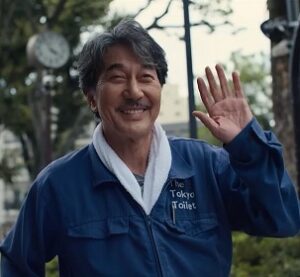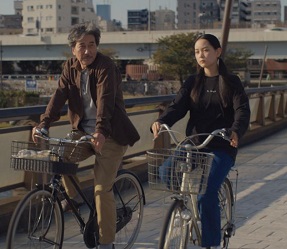Perfect Days
 Well now, here’s something I never thought I’d write. In over 40 years of reviewing films, I never thought I’d begin with: Wim Wenders’ new picture “Perfect Days” is about a man who cleans public toilets. Yes, the great German director’s latest film (and potentially last film, as he’s now 78 years old) is a Japanese-language story about a man named Hirayama who cleans restrooms.
Well now, here’s something I never thought I’d write. In over 40 years of reviewing films, I never thought I’d begin with: Wim Wenders’ new picture “Perfect Days” is about a man who cleans public toilets. Yes, the great German director’s latest film (and potentially last film, as he’s now 78 years old) is a Japanese-language story about a man named Hirayama who cleans restrooms.
Lead character
Hirayama (played by Koji Yakusho from “Shall We Dance?”) is a methodical, rigid, 55-60 year old, never-married man whose life is so orderly its very sameness would drive most of us crazy. He awakens at the exact same time every morning, makes his bed the exact same way, waters his house plants, and drives to work, where he begins his day cleaning public restrooms in the exact same order as in all previous days. He brings his lunch (yes, the same sandwich every day), and eats it on the same park bench every day. Hirayama is eternally happy; he likes his life exactly this way.
A man of very few words, Hirayama is happiest when he helps others – a boy who can’t find his mother, a young professional asking for directions, and so forth. These encounters are few, but they prove satisfying for our protagonist. His character also has the slight quirk of listening to classic American and British music of the 1960s in his car. On cassette tape, mind you. (His car is a little old, but the fact that it still has a cassette player in the console is interesting.) Hirayama is decidedly old-school, but only to the extent of anyone else in my (baby boom) generation. Yes, he has a cell phone, but he’s not “married” to it, the way many younger people are.
No traditional narrative
So, what happens to Hirayama during the course of “Perfect Days?” The original screenplay (by Wenders and Takuma Takasaki) never develops into what we would call a traditional narrative, but it does infuse Hirayama’s life with several little vignettes. These interwoven scenes are less stories than they are windows into the life of Hirayama.
Co-worker
He has what appears to be a mildly unhealthy relationship with his co-worker Takashi (Tokio Emoto), a young man less dedicated to his work than Hirayama. Takashi has the annoying habit of watching YouTube videos on his phone while scrubbing toilets. Hirayama never criticizes Takashi, but his words to his work partner are very few and far between. (And no, I didn’t know public toilet cleaners worked in pairs either; the things we learn from the movies.)
But at his core, Hirayama is a nice man. When Takashi practically begs to borrow his car for a date with a prospective girlfriend, Hirayama initially refuses, but then succumbs under pressure and compromises by attending the date with them. When Takashi wants to sell one of Hirayama’s prized cassette tapes to a local music store for cash, Hirayama refuses, but then gives the young man the same amount of cash as a compromise.
 Arrival of neice
Arrival of neice
In another development, Hirayama’s niece Niko (Arisa Nakano) shows up unexpectedly, and spends a few days shadowing Hirayama as he performs his job and lives his life. During one of their walks, Hirayama explains there are different types of people in the world; her mother and Hirayama are two completely different types of people, even though they are brother and sister.
After a couple days, Niko’s mother figures out where she’s gone, and arrives to take her back home. During their brief encounter, Hirayama’s sister asks him to come visit their dying father, who is in a nursing home. Hirayama refuses, which simply begs more questions. What is the family dynamic which caused this strain? Does Hirayama have a problem with his father? With his sister? Both? With the minimalist approach of the screenplay, we never learn any of this backstory.
Minor story lines
There are a couple other minor story lines in “Perfect Days.” Hirayama has a bar and a diner he likes to frequent. He knows the clientele both places. He also plays a daily game of tic-tac-toe with an unknown person; they each make one move every day, then place the game paper behind the mirror in one of the bathrooms Hirayama cleans. These small plot points do nothing to advance anything; they simply give us an eye into the mundane life of the lead character.
Loose structure
It’s difficult to say exactly what we are supposed to take from these vignettes, other than they flesh out the picture of the film’s central character. Wenders’ pictures are often loosely structured, but “Perfect Days” will never be mentioned in the same breath as his 1984 tour-de-force “Paris, Texas,” in which Harry Dean Stanton starred as a father with severe memory loss trying to reconnect with his young son.
That film’s screenplay was also unconstrained, but at least the story was going somewhere. Our “goal” as viewers was to learn the entire backstory of the Stanton character. How did he “lose” his son? How did he “appear” in the middle of the desert for no apparent reason? “Paris, Texas” kept us guessing as the pieces of the puzzle were reconstructed. Here, there is no such driving force to the happenings. Hirayama’s life just sits there, idle. Things occasionally happen to him, but the story doesn’t go anywhere. “Perfect Days” plays out more like a Jim Jarmusch film than a Wim Wenders film.
To what end?
So, what are we to make of “Perfect Days?” Again, I’ve been a critic for over 40 years, and I can safely respond with, “I don’t know.” It’s a mildly interesting character study, but to what end? “Perfect Days” might be a good film to watch on a rainy day when there is nothing else to do. It beats watching paint dry, but I can’t agree with the myriad of critics who have proclaimed “Perfect Days” a masterpiece. I simply don’t see it.
Andy Ray‘s reviews also appear on https://townepost.com/.